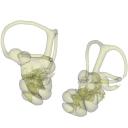















| Plane | Position | Flip |
| Show planes | Show edges |
Measured length
0.0
0.0
M3#1390
Two bony labyrinths
Data citation:
Sabrina Renaud , LĂ©a Amar, Caroline Romestaing
, Jean-Pierre Quéré and Renaud Lebrun
, 2024. M3#1390. doi: 10.18563/m3.sf.1390
Model solid/transparent

|
3D models related to the publication: Inner ear morphology in wild vs laboratory house miceSabrina Renaud, Léa Amar, Caroline Romestaing, Jean-Pierre Quéré and Renaud LebrunPublished online: 15/01/2024Keywords: fuctuating asymmetry; geometric morphometrics; intraspecific variation; Mus musculus domesticus; semicircular canals https://doi.org/10.18563/journal.m3.220 Abstract This contribution contains 3D models of left and right house mouse (Mus musculus domesticus) inner ears analyzed in Renaud et al. (2024). The studied mice belong to four groups: wild-trapped mice, wild-derived lab offspring, a typical laboratory strain (Swiss) and hybrids between wild-derived and Swiss mice. They have been analyzed to assess the impact of mobility reduction on inner ear morphology, including patterns of divergence, levels of inter-individual variance (disparity) and intra-individual variance (fluctuating asymmetry) See original publication M3 article infos Published in Volume 10, issue 01 (2024) |
|